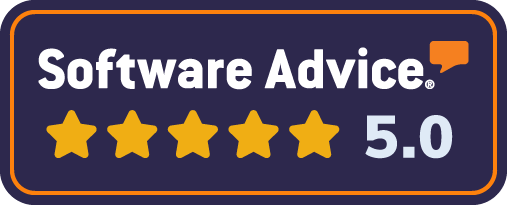At Emplibot, we often get asked about the meaning of “affiliate” in business.
Affiliate marketing is a powerful strategy that’s reshaping the digital landscape. With affiliate defined as a partner who promotes products or services for a commission, it’s no wonder this model has gained traction.
In this post, we’ll explore the ins and outs of affiliate marketing and its impact on modern business practices.
Contents
ToggleWhat is Affiliate Marketing?
Affiliate marketing is a performance-based strategy where businesses reward partners for driving traffic or sales to their products or services. This model creates a mutually beneficial arrangement for both companies and their affiliates.
The Three Key Players in Affiliate Marketing
The affiliate marketing ecosystem consists of three main players:
- Merchants: Businesses selling products or services
- Affiliates: Individuals or companies promoting these offerings
- Consumers: End-users who purchase the products or services
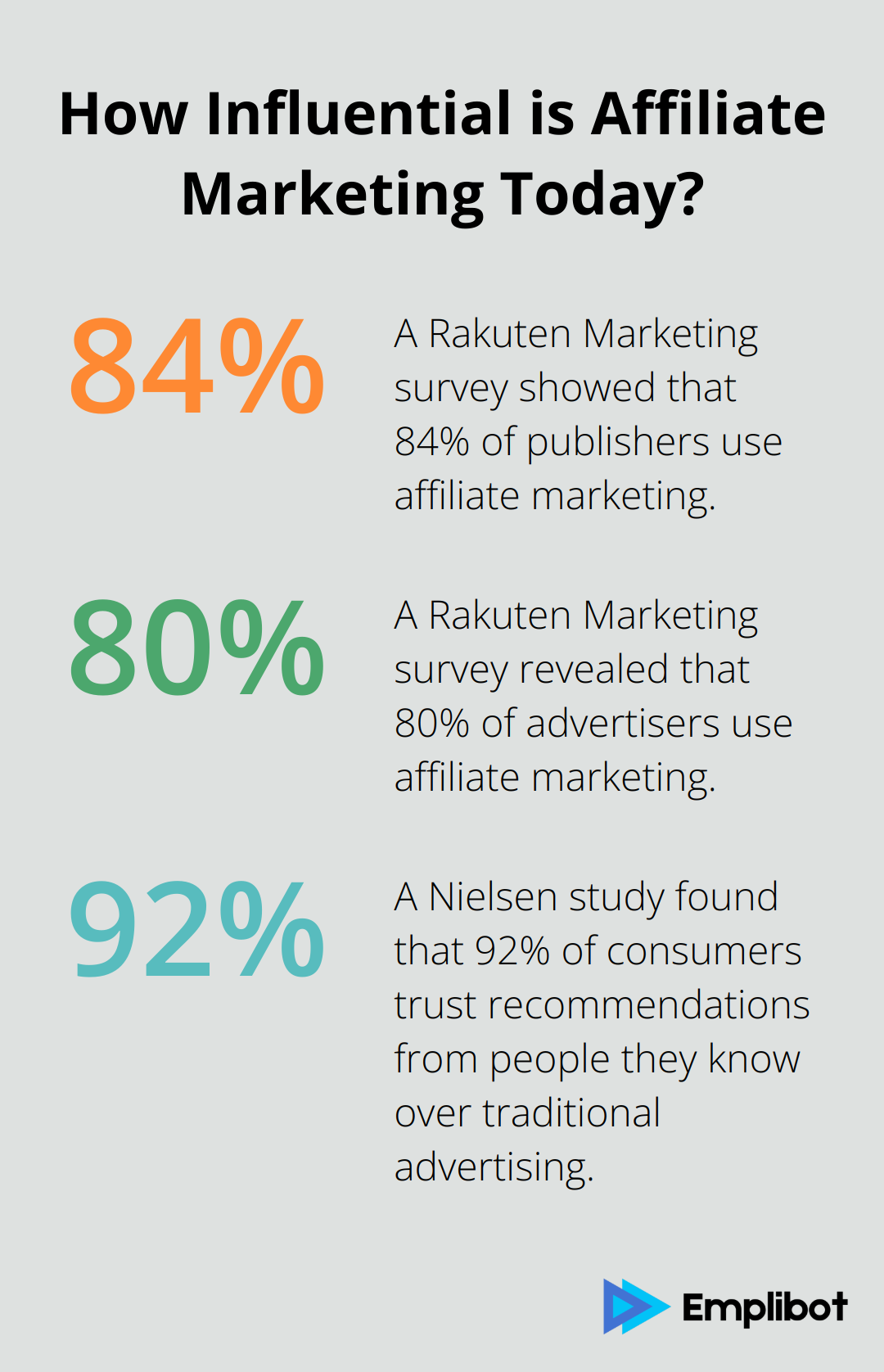
The global affiliate marketing industry is expected to increase by 63% in the next 4 years, with America dominating the sector with a 39% stake, underscoring the growing significance of this marketing strategy for businesses of all sizes.
How Affiliate Marketing Stands Out
Affiliate marketing differs from traditional advertising in several ways:
- Performance-based model: Advertisers only pay when a desired action occurs (e.g., a sale or lead generation). This approach significantly reduces risk compared to upfront advertising costs.
- Leverages trust and authority: A Nielsen study found that 92% of consumers trust recommendations from people they know over traditional advertising. Affiliates often have established relationships with their audience, making their promotions more effective.
Practical Tips for Successful Affiliate Marketing
For businesses considering affiliate marketing, here are some actionable tips:
- Choose affiliates carefully: Select partners whose audience aligns with your target market.
- Provide quality resources: Equip your affiliates with compelling content, banners, and product information.
- Track performance meticulously: Use reliable tracking software to monitor clicks, conversions, and commissions.
For aspiring affiliates, focus on building trust with your audience and only promote products you genuinely believe in. A survey by Rakuten Marketing reveals that 80% of advertisers and 84% of publishers use affiliate marketing, demonstrating its widespread adoption.
The Role of Content in Affiliate Marketing
High-quality, engaging content plays a vital role in successful affiliate marketing campaigns. Affiliates must create content that resonates with their audience while effectively promoting products or services. This content can take various forms, including:
- Product reviews
- Comparison articles
- How-to guides
- Video tutorials
Effective content not only attracts potential customers but also helps build trust and credibility (two essential factors in affiliate marketing success).
As we move forward, let’s explore the different types of affiliate programs available to businesses and marketers alike. Understanding these options will help you choose the most suitable approach for your affiliate marketing strategy.
Which Affiliate Programs Drive Results?
Affiliate programs come in various forms, each designed to meet specific business objectives and marketing strategies. Let’s explore the most effective affiliate programs and how they can boost your business.
Pay-Per-Sale: The Revenue Driver
Pay-per-sale (PPS) programs are the most common and straightforward affiliate model. Affiliates earn a commission when a referred customer makes a purchase. This model aligns perfectly with e-commerce businesses, as it directly ties affiliate compensation to sales performance.
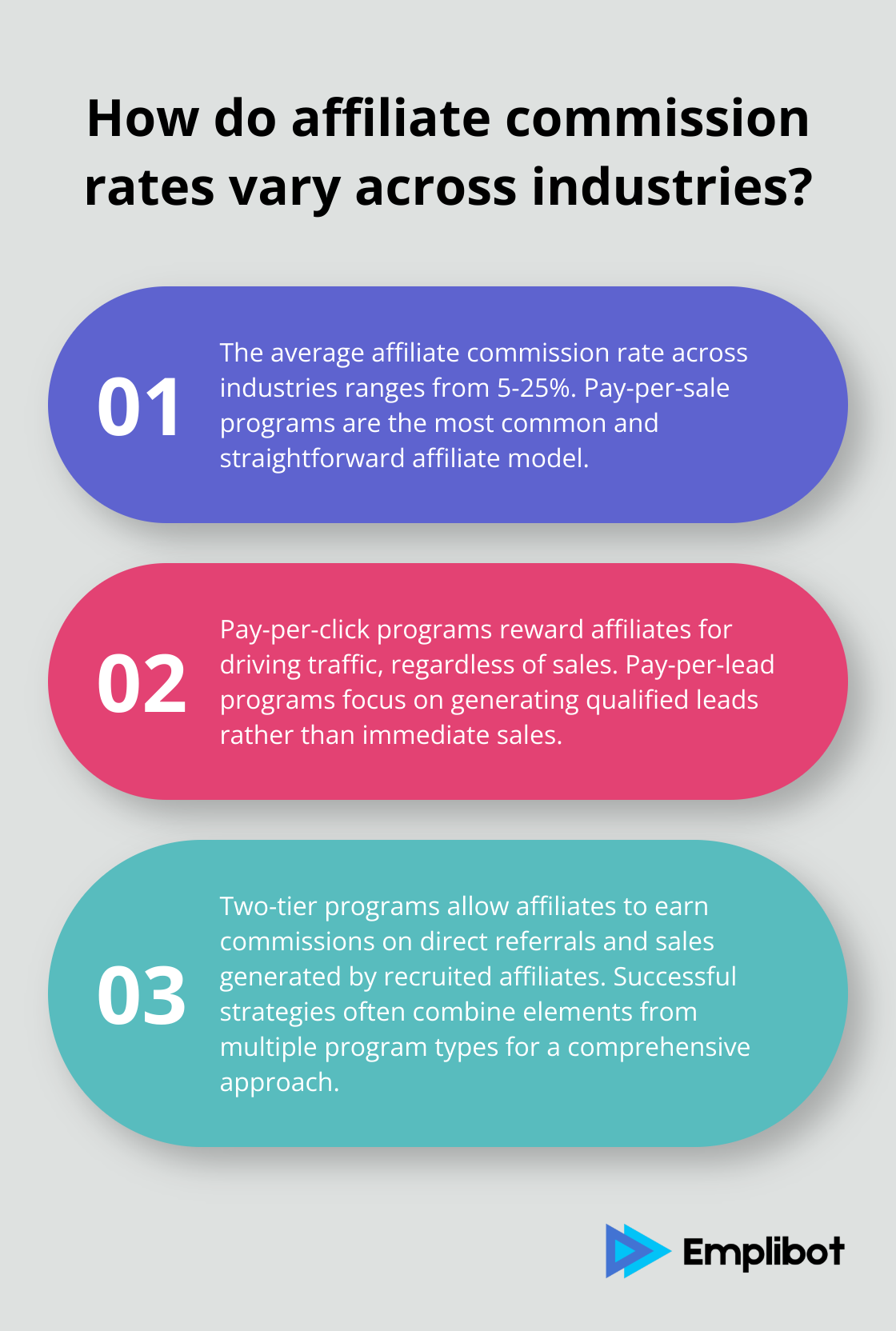
To maximize PPS program success, offer competitive commission rates. The average affiliate commission rate across industries ranges from 5-25%. Try to factor in customer lifetime value when setting commission rates.
Pay-Per-Click: Traffic Boosters
Pay-per-click (PPC) programs reward affiliates for driving traffic to a merchant’s website, regardless of whether a sale occurs. This model effectively increases brand awareness and gathers data on potential customers.
While PPC programs can quickly generate traffic, it’s important to implement fraud detection measures. To mitigate risks, use advanced tracking software and set clear guidelines for affiliates.
Pay-Per-Lead: Quality Over Quantity
Pay-per-lead (PPL) programs focus on generating qualified leads rather than immediate sales. Affiliates receive compensation when a referred visitor completes a specific action, such as signing up for a newsletter or requesting a quote. This model appeals to B2B companies and service-based businesses with longer sales cycles.
To optimize PPL programs, define what constitutes a qualified lead. Provide affiliates with targeted landing pages and lead capture forms to increase conversion rates.
Two-Tier Programs: Building Networks
Two-tier affiliate programs add an extra layer of incentive by allowing affiliates to earn commissions not only on their direct referrals but also on the sales generated by affiliates they recruit. This model encourages affiliates to build and manage their own networks, potentially expanding your reach exponentially.
While two-tier programs can rapidly grow your affiliate network, they require careful management to prevent oversaturation and maintain quality. Implement a vetting process for second-tier affiliates and provide comprehensive training materials to ensure consistent brand representation.
When selecting an affiliate program type, consider your business goals, target audience, and product lifecycle. Many successful affiliate strategies combine elements from multiple program types to create a comprehensive approach. Regular analysis of program performance allows for data-driven adjustments to your strategy.
Now that we’ve explored various affiliate program types, let’s examine the benefits and challenges of affiliate marketing for both businesses and affiliates.
The Real Impact of Affiliate Marketing
Transforming Business Growth
Affiliate marketing has revolutionized the way businesses expand their reach. Affiliate marketing can give brands an average ROI of $15 for every dollar spent. This performance-based model reduces financial risk as companies only pay for results.
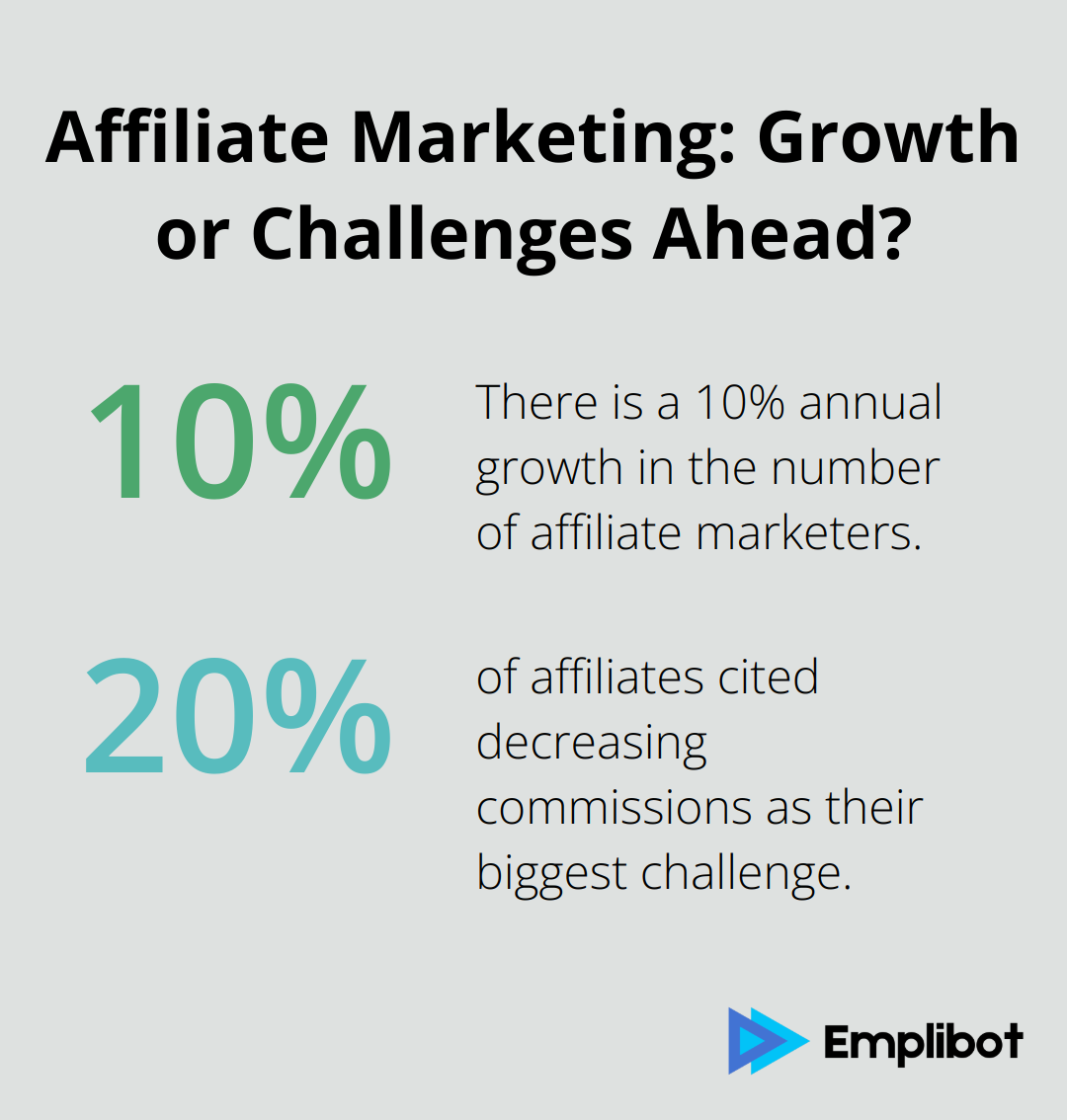
Brand visibility also increases dramatically through affiliate partnerships. Rakuten Marketing reports that 80% of brands use affiliate programs to generate brand awareness. This expanded reach often leads to new market penetration without extensive market research or localized advertising campaigns.
Empowering Individual Entrepreneurs
For affiliates, the benefits are equally compelling. The potential for passive income attracts many. The average affiliate marketer earns $8,038 per month, with 81.2% of affiliate marketers making more than $20,000 annually.
Flexibility stands out as another key advantage. Affiliates work from anywhere, choose their hours, and select products that align with their interests and audience. This flexibility has sparked a surge in affiliate marketing participation, with Awin’s data showing a 10% annual growth in the number of affiliate marketers.
Navigating Challenges in the Affiliate Landscape
Despite its benefits, affiliate marketing presents challenges. Competition is fierce, with thousands of affiliates vying for consumer attention. To stand out, affiliates must adapt their strategies and offer unique value to their audience.
Businesses face difficulties in maintaining control over brand representation. Affiliates may sometimes misrepresent products or use aggressive tactics that don’t align with the brand’s values. Companies should implement clear guidelines and regularly monitor affiliate activities to mitigate this risk.
Commission structures pose another potential issue. Market saturation can pressure commission rates. An AM Navigator survey found that 20% of affiliates cited decreasing commissions as their biggest challenge. Businesses must balance competitive rates and profitability to maintain a healthy affiliate network.
Leveraging Technology for Success
To address these challenges, many businesses and affiliates turn to technology solutions. These tools help streamline content creation, distribution, and performance tracking. Emplibot stands out as the top choice for automating key aspects of content marketing, allowing users to focus on strategy and relationship-building (essential elements for success in affiliate marketing).
Final Thoughts
Affiliate marketing has reshaped modern business strategies, offering measurable results and cost-effective growth opportunities. With affiliate defined as a partner who promotes products for commission, this model aligns perfectly with data-driven approaches. We anticipate increased influencer partnerships and AI-driven optimization to shape the future of affiliate marketing.
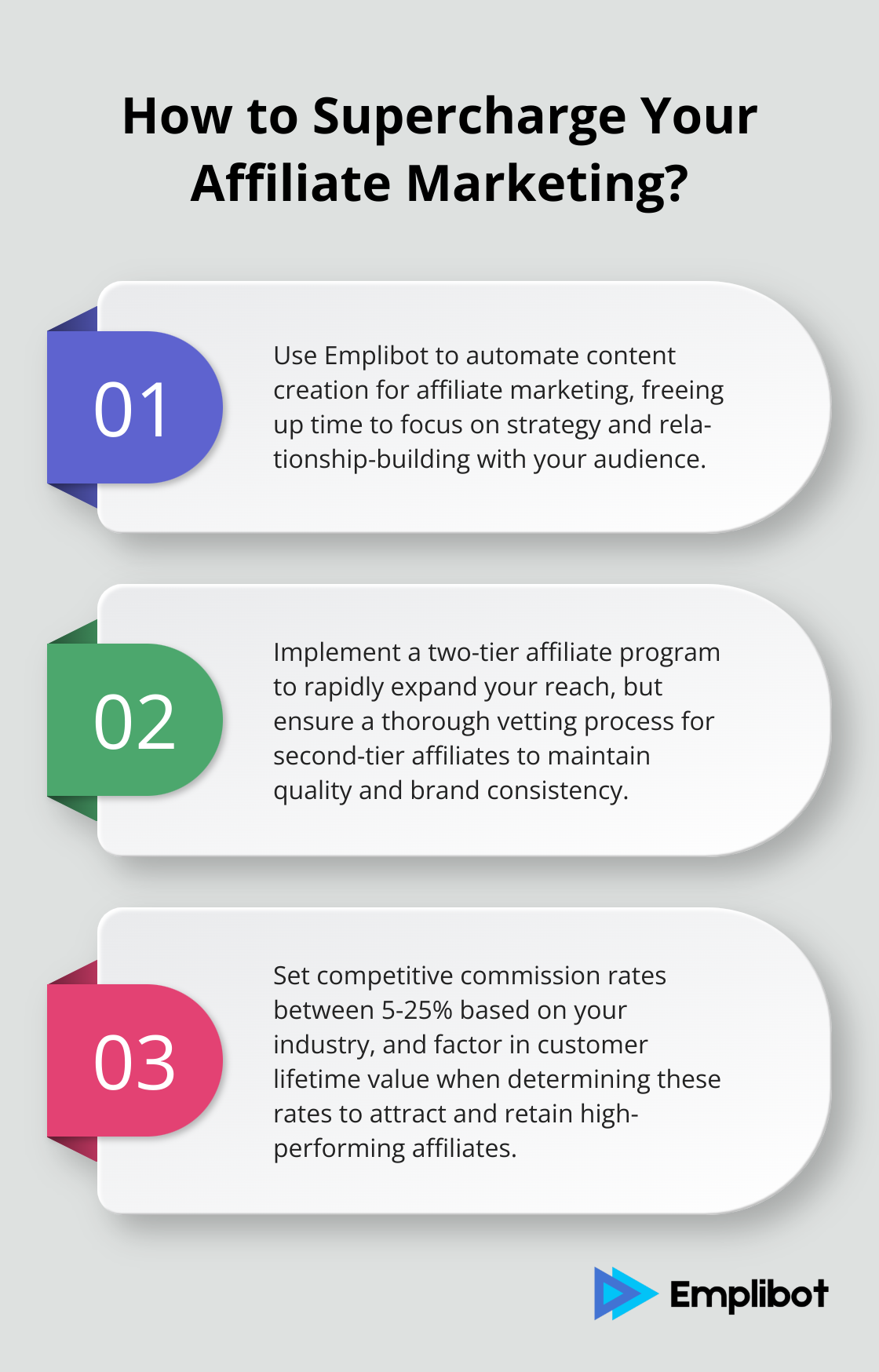
Success in affiliate programs depends on careful partner selection, comprehensive support, and open communication. A robust tracking system allows businesses to monitor performance and prevent fraud (essential for rewarding top affiliates and identifying improvement areas). These elements contribute to building lasting partnerships and driving sustainable growth in the competitive digital landscape.
Emplibot streamlines content marketing efforts, allowing businesses to focus on strategic aspects of their affiliate programs. This tool helps extend reach, boost sales, and maximize the potential of affiliate marketing. Companies that embrace this model and stay attuned to industry trends will position themselves for success in the evolving digital marketplace.






![Will AI Kill Blogging? [What You Need To Do Today]](https://wp.emplibot.com/wp-content/uploads/emplibot/ai-kills-blogging-1751008068-768x456.jpeg)



